
There has been the rise of large-scale factories/industries in India in the latter half of the nineteenth century. Major Moore, Inspector-in- Chief of the Bombay Cotton Department, in his Report in 1872-73, first of all, raised the question for the provision of legislation to regulate the working condition in factories; the first Factories Act was enacted in 1881.

mohan62 + Follow
Download PresentationAn Image/Link below is provided (as is) to download presentation Download Policy: Content on the Website is provided to you AS IS for your information and personal use and may not be sold / licensed / shared on other websites without getting consent from its author. Content is provided to you AS IS for your information and personal use only. Download presentation by click this link. While downloading, if for some reason you are not able to download a presentation, the publisher may have deleted the file from their server. During download, if you can't get a presentation, the file might be deleted by the publisher.

THE EMPLOYEE’S STATE INSURANCE ACT 1948 . ESI Scheme … .
974 views • 38 slides

FACTORIES ACT, 1948. THE FACTORIES ACT, 1948. INTRODUCTION.
1.53k views • 13 slides

EMPLOYEE’S STATE INSURANCE ACT, 1948. HISTORICAL BACKGROUND.
1.57k views • 44 slides
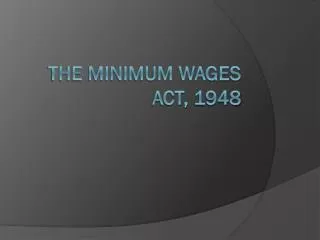
THE MINIMUM WAGES ACT, 1948. APPLICABILITY OF THE ACT. Applicable to Whole India Central Government Act of 1948 and Rules made there under will be applicable and the directions given in the Act should be followed.
3.33k views • 33 slides

Employee State Insurance Act 1948. EFFORTS by : DEPARTMENT OF SOCIALWORK . What is ESI. Comprehensive Social Security Scheme. Designed to protect employee in organisated sector Components are Sickness Maternity Disablement Death Medical care.
4.52k views • 40 slides

The FACTORIES ACT, 1948. T he Act has been enacted primarily with the object of protecting workers employed in factories against industrial and occupational hazards.
15.92k views • 50 slides

The Factories Act, 1948 Chapter-IV SAFETY. Every dangerous part of any machinery (prime mover, flywheel, water turbine, electric generator, motor, transmission machinery) shall be securely fenced by safeguards, maintained and kept in position while the machine is working. Proviso:
407 views • 12 slides

Factories Act, 1948. Provisions relating to hazardous processes. Section 41A: Constitution of site appraisal committees
1.34k views • 9 slides
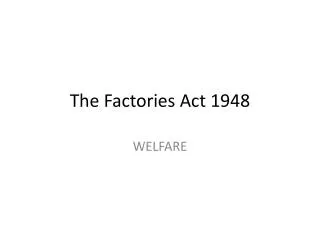
The Factories Act 1948 . WELFARE.
299 views • 5 slides
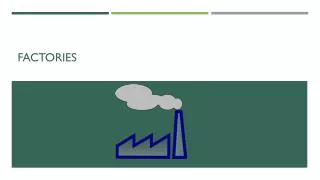
Factories. Trains – Choo choo. Steam engines became stronger and more efficient Railways began to pop up all over Britain First major train was called the rocket – could travel at an amazing 39km per hour. Cottage Industry.
261 views • 10 slides

EMPLOYEES’ STATE INSURANCE ACT 1948. ESI ACT PROVISIONS . Application : In the first instance, it shall apply to all factories including govt factories other than seasonal factories and Establishments.
460 views • 12 slides

The Employees' State Insurance Act, 1948. Employee State Insurance Scheme . Mission Statement To provide for certain benefits to Employees in case of sickness, maternity and employment injury and to make provisions for related matters.
1.76k views • 20 slides
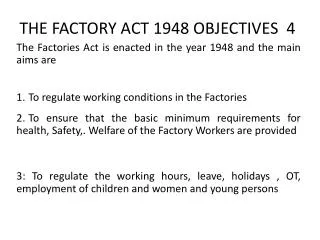
THE FACTORY ACT 1948 OBJECTIVES 4. The Factories Act is enacted in the year 1948 and the main aims are To regulate working conditions in the Factories To ensure that the basic minimum requirements for health, Safety,. Welfare of the Factory Workers are provided
2.52k views • 15 slides

THE FACTORIES ACT, 1948. FACTORIES LEGISLATION OF GREAT BRITAIN. Factories legislations of Britain. The Factory Acts were a series of Acts passed by the Parliament of the United Kingdom
1.77k views • 85 slides
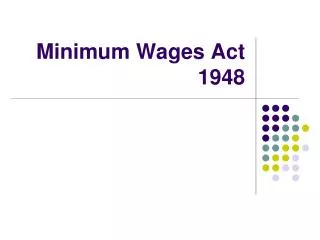
Minimum Wages Act 1948. History of Minimum Wages. ILO Convention no26 in1928 Recommended Machinery for Fixation of minimum wages •The Standing Labour Committee Of Tripartite organization(ILC)Discussed in1943 •On 13.04.1946 Dr. Ambedkar introduced minimum wages bill.
956 views • 20 slides

INSIGHT ON The FACTORIES ACT, 1948. What the Department of Factories and Boilers is all about?. One amongst the 50+ Government departments. Main Objective.
1.89k views • 140 slides
 What provisions of Indian Factories Act of 1948 apply to Industrial sanitation Explain each point clearly" width="320px" />
What provisions of Indian Factories Act of 1948 apply to Industrial sanitation Explain each point clearly" width="320px" />
For Assignment Solution Contact Casestudyhelp.in https://www.casestudyhelp.in 9422028822 Operation Management 1) What are the objectives of purchase department? Explain briefly the purchase procedure? 2) What are the factors to be considered for planning the lay-out of a new factory? 3) What is waste management? Explain the importance of waste management. 4) What are the advantages & disadvantages of different types of site location? 5) What is power supply? What alternative power supplies are available to an industrial unit? 6) What provisions of Indian Factories Act of 1948 apply to Industrial sanitation? Explain each point clearly. 7) Explain briefly the functions of production planning & control. 8) What are the usual errors made in plant location selection? 9) Explain the steps involved in maintenance job planning and scheduling 10) Write short notes on any two of the following: (a) Material requirement planning. (b) Safety management (c) Time study For Assignment Solution Contact Casestudyhelp.in https://www.casestudyhelp.in 9422028822
 What provisions of Indian Factories Act of 1948 apply to Industrial sanitation Explain each point clearly" width="320px" />
What provisions of Indian Factories Act of 1948 apply to Industrial sanitation Explain each point clearly" width="320px" />
Need Answer Sheet of this Question paper Contact us at answersheethelp@gmail.com M: 7019944355

www.answersheets.in info.answersheets@gmail.com info@answersheets.in 91 95030-94040 Corporate Law 1."All contracts are agreements but all agreements are not contracts." Discuss this statement in light of the essential elements of a valid contract. Also mention briefly the different kinds of agreements under the India Contract Act, 1872. 2. Discuss, what are the rights, liabilities and disabilities of a minor as per the Indian Partnership Act, 1932. 3. What do you understand by implied warranties and conditions of sale according to the sale of Goods Act, 1930? 4. Differentiate between lay-off and retrenchment according to the Industrial Disputes Act, 1947. 5. Give the provisions related to safety as given in the Factories Act, 1948. 6. What are the characteristics or essential features of a company and briefly mention the types of companies. 7. What do you understand by electronic governance and what are the attributes of electronic records as mentioned in the Information Technology Act, 2000. 8. Discuss the concept of free consent and misrepresentation as per the Indian Contract Act, 1872. 9. Distinguish between private and public company. What are the special privileges of a private company over public company according to Companies Act, 1956? 10. Write short notes on any two of the following: (a) Cyber regulation (b) Industrial Dispute (c) Breach of Contact (d) Voidable contracts. www.answersheets.in info.answersheets@gmail.com info@answersheets.in 91 95030-94040

E.S.I. Scheme being contributory in nature, all the employees in the factories or establishments to which the Act applies shall be insured in a manner provided by the Act. The contribution payable to the Corporation in respect of an employee shall comprise of employer’s contribution and employee’s contribution at a specified rate
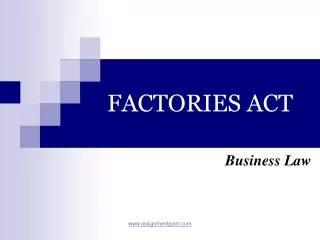
FACTORIES ACT. Business Law. FACTORIES ACT-Definitions. Adolescent- a person who has completed 16 years but not completed 18 years of age Adult -a person who has completed 18 years of age Child - a person who has not completed 16 years age
621 views • 46 slides

FACTORIES ACT, 1948. THE FACTORIES ACT, 1948. INTRODUCTION.
434 views • 13 slides